Key takeaways:
- Effective book marketing is rooted in understanding and connecting with your target audience, focusing on their preferences and desires.
- Building a strong author platform through a website, social media, and community engagement enhances reader relationships and fosters loyalty.
- Utilizing email marketing allows for direct communication with readers, sharing personal insights and story behind the writing, which deepens connections.
- Measuring marketing success through analytics and reader engagement helps refine strategies, adapting to audience feedback for improved results.
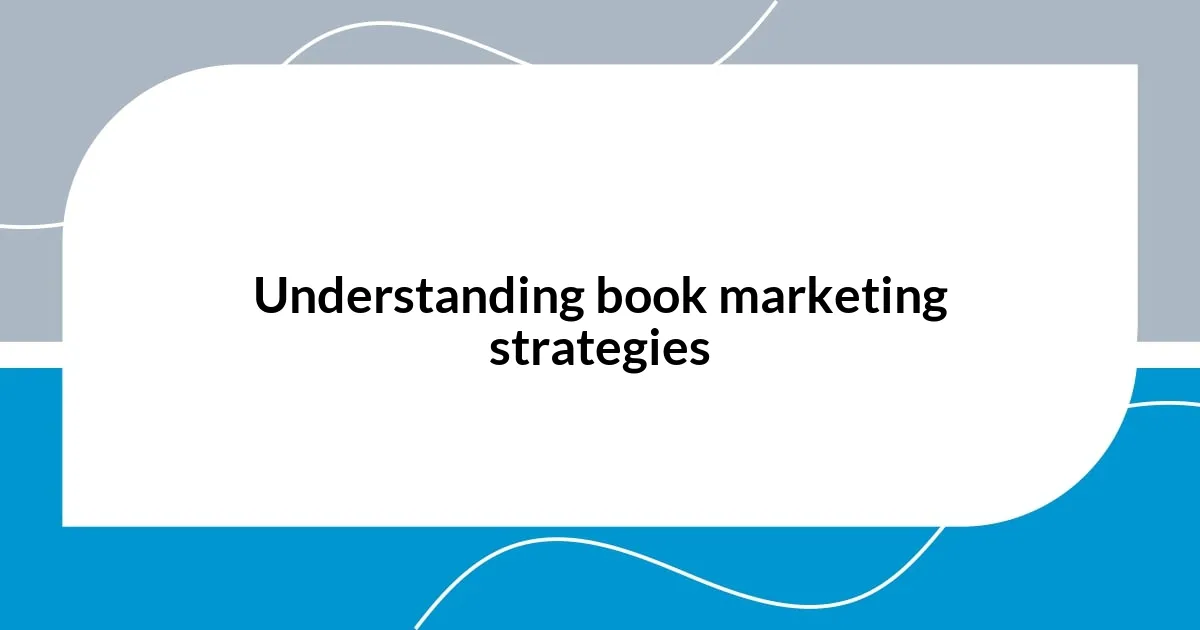
Understanding book marketing strategies
Understanding book marketing strategies requires recognizing that it’s not just about selling a book; it’s about creating a genuine connection with readers. I remember the first time I published a book. I felt overwhelmed by the myriad of marketing options available, wondering which would resonate most. This experience taught me that effective strategies come from truly understanding your audience and what they seek in a book.
As I delved deeper into marketing, I realized the importance of building a personal brand. When I engaged with readers through social media, I discovered that sharing my writing journey made them feel invested in my work. Have you ever thought about what parts of your life you could share to create that same connection? Authenticity in your messaging can significantly bolster your marketing efforts, inviting readers to join you on your literary path.
One key strategy that has always stood out to me is leveraging partnerships with influencers and bloggers. Collaborating with someone who shares your target audience can open doors you never even considered. Reflecting on my own experience, one partnership led to a spike in book sales simply because the influencer’s followers trusted their recommendations. Isn’t that a powerful reminder that sometimes, it’s not just about what you know but who you know in the literary world?
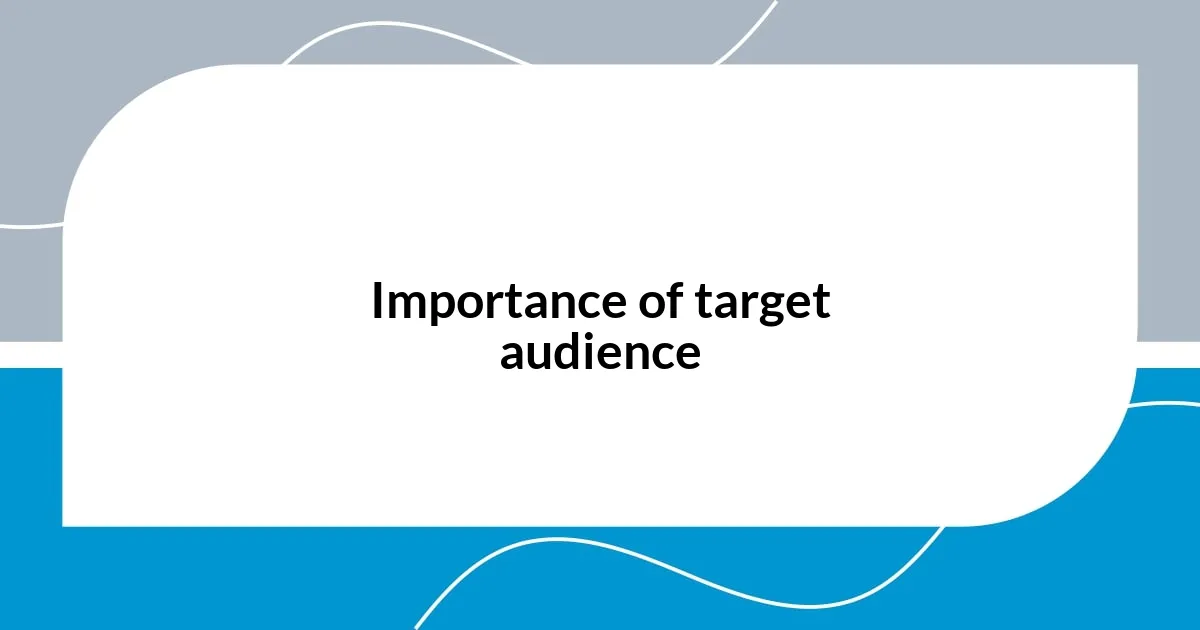
Importance of target audience
Understanding your target audience is crucial. I remember the first time I got feedback from readers who shared their thoughts on my book. It was enlightening to hear their perspectives; it helped me realize that their interests and preferences directly shared insights into my writing. Knowing who is picking up your book enables you to tailor your marketing strategies effectively, ensuring that your message resonates with the right people.
Think about your own reading habits. Have you ever gravitated toward a book because it was marketed to your specific interests? From my experience, when I crafted book descriptions that spoke directly to my target audience’s desires, I saw engagement soar. It became clear to me that marketing isn’t only about reaching the most people but rather about reaching the right people—those who will connect with the story and champion it.
When I first targeted a niche audience, the response was overwhelming. I stumbled upon a Facebook group dedicated to my genre. Engaging with members there not only helped me understand their desires but also got them excited about my upcoming work. This type of targeted interaction has shown me that the depth of connection often outweighs the breadth of outreach.
| Aspect | General Audience | Target Audience |
|---|---|---|
| Definition | Anyone who might read the book. | A specific group of readers with shared interests. |
| Marketing Cost | Higher, due to broad outreach. | Lower, as efforts are focused. |
| Engagement | Lower, as messaging may not resonate. | Higher, with tailored messages creating strong connections. |
| Feedback | Vague and less actionable. | Specific and insightful, guiding future projects. |
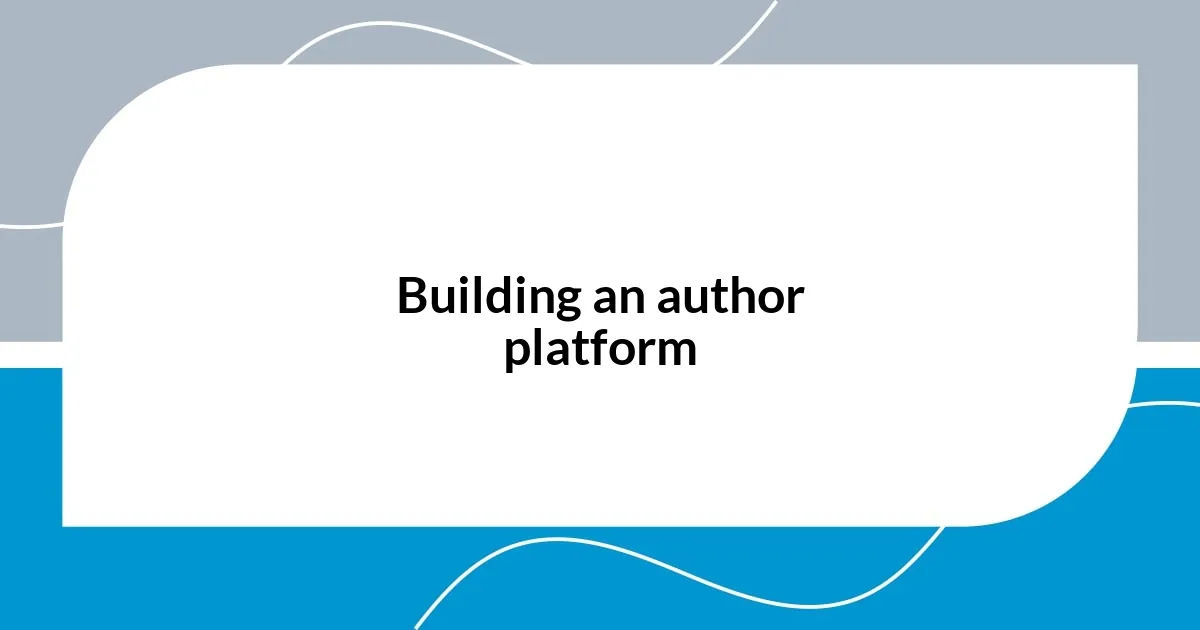
Building an author platform
Building an author platform is a journey of establishing your presence in the literary world. I can vividly recall the moment I decided to create a dedicated website. It felt daunting at first, but having a digital space to house my blog, updates, and reader interactions became a cornerstone of my author identity. This platform not only showcased my work; it became a hub where readers could connect with me on a more personal level.
- Website: A professional site acts as your online home. Invest in a user-friendly design that reflects your brand.
- Social Media: Choose platforms where your audience hangs out. I opted for Instagram due to its visual nature, sharing snippets of my writing journey and engaging directly with followers.
- Email Newsletter: Building an email list is invaluable. I send regular updates and exclusive content to my subscribers, making them feel valued and more connected to my writing.
- Community Engagement: Attend local book clubs or literary events. I remember meeting a reader at a local coffee shop; that chance encounter made me realize how personal connections add depth to my platform.
Creating such a platform took time and effort, but the impact it had on my ability to connect with readers has been profound. Each interaction, whether online or offline, strengthened my community and fostered genuine relationships that I cherish.
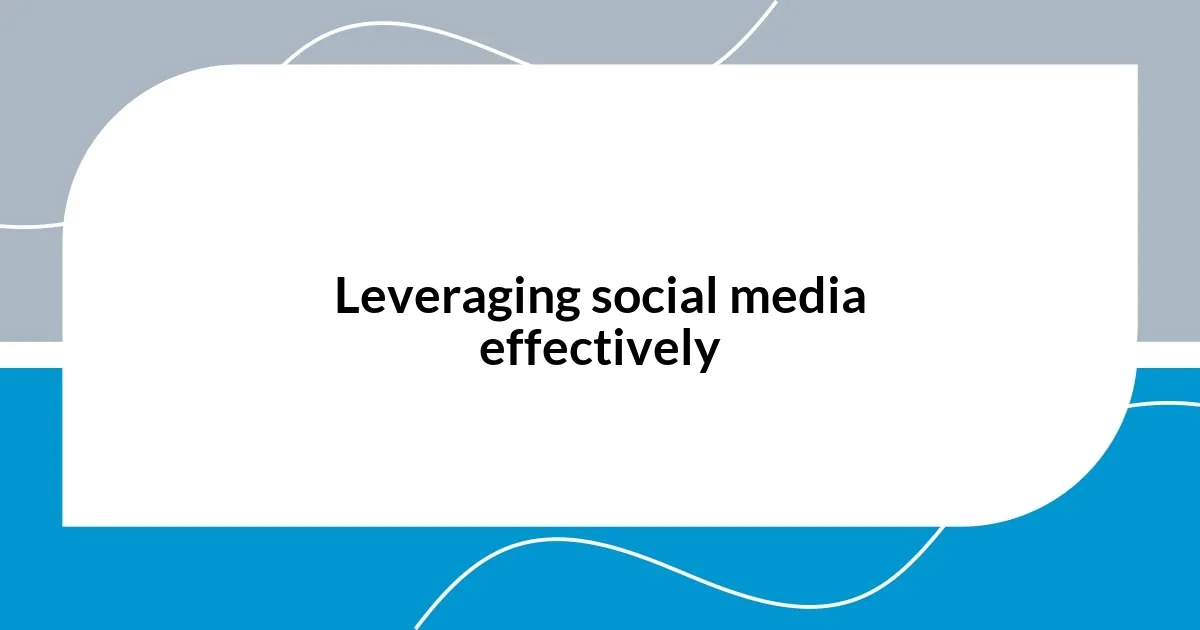
Leveraging social media effectively
Social media has transformed the way authors interact with readers, and I’ve seen firsthand how vital it is to embrace it effectively. I recall a time when I launched a book and decided to host a live Q&A session on Twitter. The excitement was palpable as readers tuned in. Their questions about my characters and plots prompted discussions that deepened our connection. That kind of real-time engagement has a magic to it, fostering a sense of community that can elevate your marketing.
When I think about which social platforms truly resonate with my audience, it’s amazing how tailored content can drive engagement. For instance, on TikTok, I share fun behind-the-scenes videos of my writing process. I’ve watched my follower count grow, but more importantly, I see lovely messages from readers who feel they know me better. Isn’t it fascinating how a short clip can spark such a personal connection? It’s these little moments that really solidify loyalty, turning casual readers into devoted fans.
I also believe consistency is key in posting content. I remember the initial struggle to maintain a schedule, wondering if my followers would even notice. But soon enough, I found my rhythm. I started posting snippets of my writing journey every Thursday, and my audience began to look forward to it. This not only kept my readers engaged but also created predictable touchpoints that reinforced our bond. Have you ever felt that little rush of excitement when a favorite author shares something new? That’s the kind of feeling I aimed to replicate.
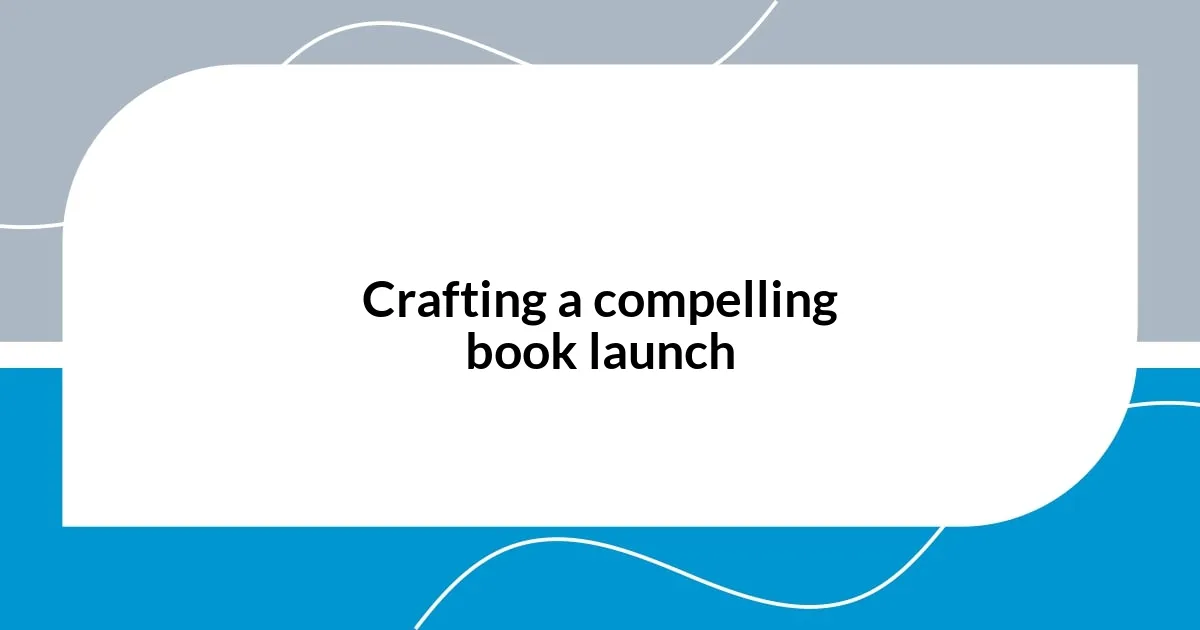
Crafting a compelling book launch
When it comes to crafting a compelling book launch, I believe the anticipation you build ahead of time is crucial. I remember gearing up for my debut novel and deciding to send exclusive sneak peeks to my email list. Watching subscribers respond with excitement made me realize how powerful a little intrigue can be. It also served as a fantastic reminder that my readers were just as invested in the story as I was. How can you create that buzz around your own launch?
The day of my book launch still stands out in my mind as a whirlwind of excitement and nerves. I opted for a virtual launch party that included readings, giveaways, and even some fun quizzes about my book. Surprisingly, the interaction didn’t just stop at me; there were lively exchanges between readers, sparking discussions about themes and characters. This sense of community transformed what could have been a solitary event into a vibrant celebration. Can you imagine the impact of creating an event that brings your readers together?
Additionally, I’ve learned that post-launch momentum is vital. After my launch, I kept the enthusiasm going by inviting readers to share their experiences with my book on social media. When I saw their photos of them with the book in cozy reading nooks or their favorite quotes shared online, it filled me with joy and further solidified their investment in my work. There’s something so rewarding about seeing readers connect personally with my writing, don’t you think? That’s the kind of connection that not only fuels future projects but builds a lasting readership.
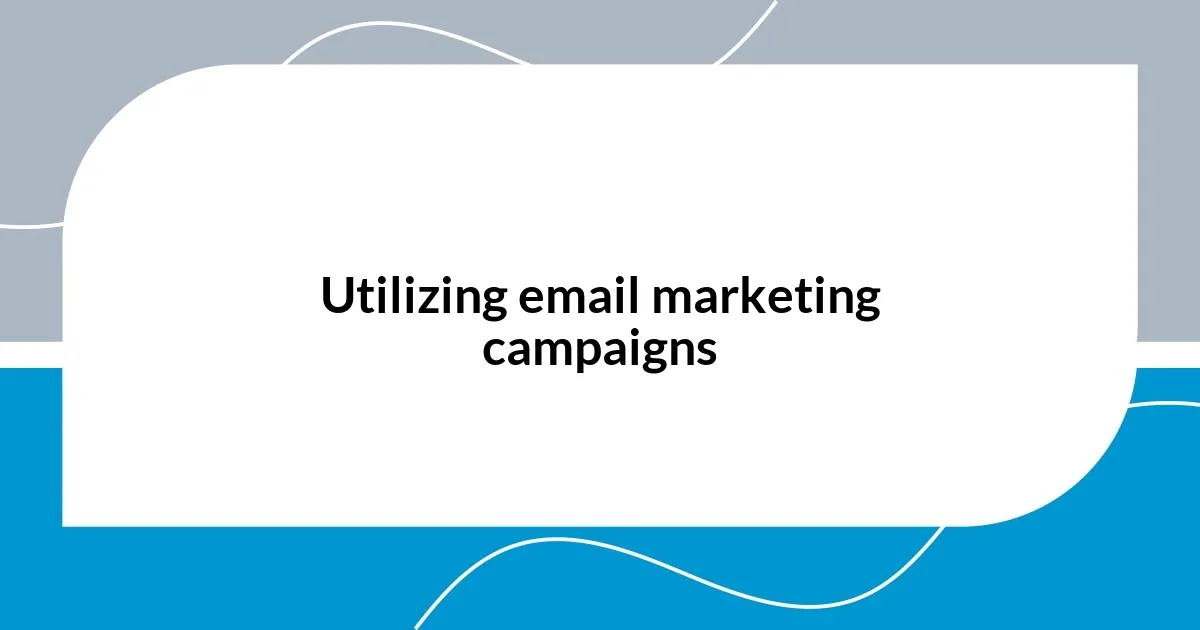
Utilizing email marketing campaigns
Email marketing campaigns have been a game changer in my book marketing toolkit. I recall sending out my very first newsletter, filled with updates and personal insights. The sheer thrill of connecting with readers directly through their inboxes was exhilarating. It felt like hosting a small gathering where everyone was keen to hear what I had to say—how often do we get to share our thoughts directly with those who care?
Crafting my emails was an enjoyable challenge. I learned to weave in storytelling elements that resonate with my audience. One time, I shared a personal story about the inspiration behind my latest character, and the responses flooded in! It turned out that readers loved diving deeper into the “why” behind my work. Have you ever opened an email from your favorite author and felt that rush of excitement as you read their inside scoop? That’s what I aim to replicate in my own campaigns.
For me, keeping the communication regular has been essential. I decided to send out a monthly email that balances updates, snippets of new work, and even unique writing tips. It’s comforting to know that my readers look forward to these little moments of connection. I often wonder, how can I create content that feels valuable and personal? But each time I hit “send,” I remember that these shared experiences are what build a community. The engagement I receive not only motivates me but also deepens my relationship with my readers. Isn’t that what every author dreams of?

Measuring marketing success and adjustments
Measuring marketing success is a crucial aspect of refining my strategies. I vividly recall the first time I analyzed the effectiveness of an online ad campaign. After seeing a spike in book sales following particular ads, I felt a thrill that confirmed one simple truth: numbers tell a story. They helped me understand what resonated with my audience and guided my future marketing choices.
Adjustments often come after I assess reader engagement metrics. One memorable experience was after a social media initiative fell flat. I took a step back and realized I hadn’t been addressing my audience’s interests effectively. By tweaking my approach and incorporating their feedback, I quickly saw a boost in interaction. Have you ever felt the awkwardness of trying something new that didn’t quite hit the mark? It’s all part of the learning curve, and I’ve found that each misstep is an opportunity for growth.
I’ve learned the importance of being proactive about adapting my strategies. For example, when I noticed followers on my author platform weren’t engaging with certain types of posts, I didn’t hesitate to pivot. Instead, I began sharing behind-the-scenes content about my writing process, which ignited interest and sparked conversations. It’s fascinating how a small shift can lead to big changes in your audience’s response. How can you discover what your readers truly want to see? By listening, experimenting, and being open to evolving your approach continuously.